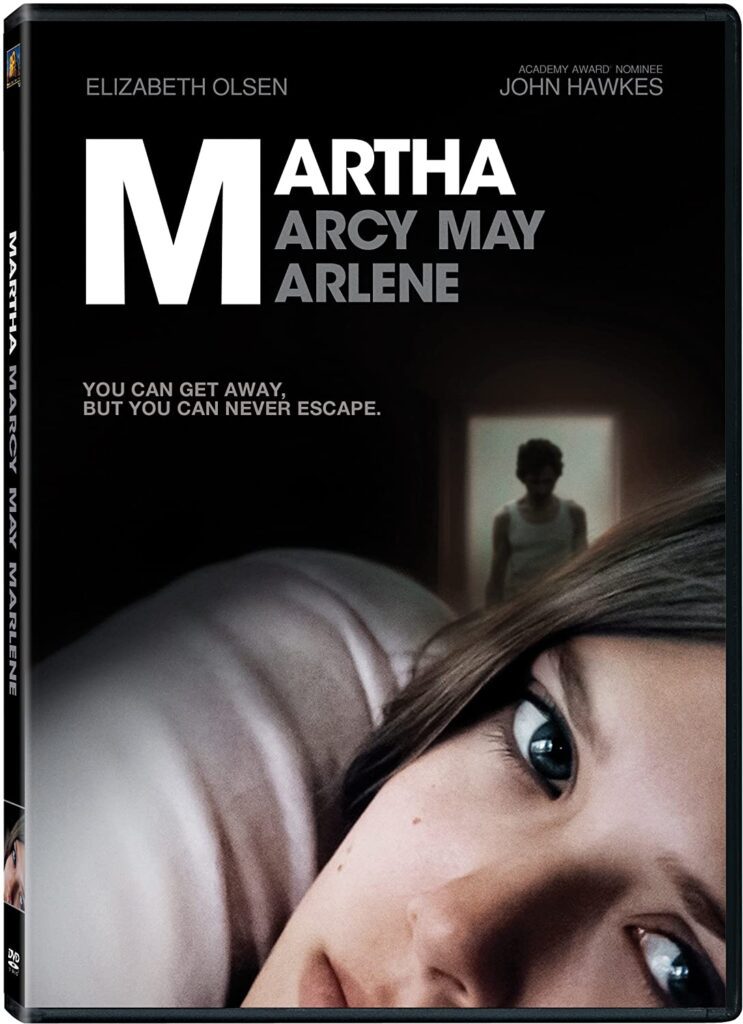
Written by Amanda Salazar
Martha Marcy May Marlene is a daring feature film debut from director/writer Sean Derkin about the affects of being in a cult. Through flashbacks and careful editing, two stories play off one another, making this a film for the attentive and patient viewer that leaves a lingering uneasiness when it’s over.
Martha (Elizabeth Olsen) is first seen running away from what seems to be communal living on a farm. After a panicked phone call, Martha is picked up and taken to her sister’s home in Connecticut. Here you find out that Martha has been missing for the past two years and it is clear that there is something wrong with her.
Marcy May is the name given to Martha by the leader of the communal family, Patrick (John Hawkes), when she arrived at the farm. Participating in her new identity, she has unmistakably been indoctrinated into this life. Along with a new name, she was taught that if she was to stay that she must participate with chores and traditional duties, even if that means unknowingly sleeping with Patrick to begin her “detoxification” process. The stories of Marcy May and Martha interweave as she spends time settling into her sister’s home. Certain things in the present trigger her previous life on the farm, showing that although she is not a part of it any longer she is still haunted by the experience.
As her sister tries to find out what is wrong with her, Martha struggles with the fear of being caught for leaving the farm. As the film progresses, we are given more information as to why she left, building steadily like a well-crafted thriller. The music and pacing of MMMM help as neither give any indication of what is to happen next. There is no constructed concept of time in this film causing the interconnected moments to seem very distant but often as close to one another as possible. For instance when she jumps in a lake from her sister’s boat she emerges in a alcove, naked with her new family. Often unsure of what time and space you are a part of, effects of the cult powerfully seep into both storylines.
John Hawkes gives a powerful yet subtle performance as Patrick that is necessary to understanding Martha’s attachment to the farm. Very unassuming, Patrick is often talked about but rarely seen. They are very structured at the farm, where the men eat before the women, and Patrick is the only one to father children. But at Martha’s most vulnerable times, Patrick is there either comforting, persuading, and ultimately punishing her as she “failed” to meet his standards.
Martha Marcy May Marlene challenges what it means to be “normal” and how desperately people want to be accepted. Her friend and mentor at the farm embraces Martha after her first time with Patrick, explaining that she wants that again because it is special and only happens once. At one point Martha’s sister and her fiance are having sex, and she walks in and curls up on the bed next to them. Martha is reprimanded for how inappropriate this is but to her she didn’t want to be alone and that kind of communal interaction is comforting to her. At the farm everything is shared; this is just how they are. But when contrasted with her sister and what it means to be “normal,” the tension becomes palpable, making both of the worlds seem distant and unfitting.
The power of a cult lies in the individual feeling like they are part of something bigger. Given a leadership role, Martha flourishes at the farm. Of course, fear is maintained as her role is easily taken away when she steps out of line, thinking for herself. Elizabeth Olsen delicately captures the conflicting tension of how far one will go to be accepted and feel part of a family.
Martha Marcy May Marlene premiered at the 2011 Sundance Film Festival and as a true independent film, it is a refreshing look at a challenging subject. Despite its alliteratively difficult title, the film interestingly uses a character that goes by different names to examine what it means to belong and to create an identity in a setting that is both strange and at most times uncomfortable in its solidarity.
On DVD the film has only an extra short film by the director made while filming MMMM. As stated in opening title cards the short shows how one gets into this kind of cult setting. There are no other special features.